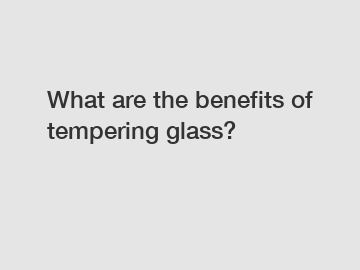Dec. 28, 2023
Construction
What are the benefits of tempering glass?
Glass is a versatile material that has been used for centuries in various applications. From windows in buildings to car windshields, glass plays a vital role in our daily lives. To enhance its strength and durability, tempered glass has become a popular choice. Tempering involves subjecting glass to intense heat before rapidly cooling it, which changes its structure and offers several benefits. In this article, we will explore the benefits of tempering glass and why it is an excellent option for various applications.
1. Safety and Durability.

One of the primary advantages of tempering glass is its increased safety and durability. When a sheet of glass is tempered, it becomes four to five times stronger than regular glass. This strength is due to the heat treatment that alters the internal stress and adds compressive forces to the surface. As a result, tempered glass is able to withstand higher impacts and is less likely to break into sharp, jagged shards. Instead, it breaks into small, rounded pieces called "dice," reducing the risk of injury. Therefore, tempered glass is commonly used in applications where safety is a concern, such as vehicle windows, shower enclosures, and glass doors.
2. Thermal Resistance.
Another significant benefit of tempered glass is its increased resistance to thermal stress. Tempered glass can withstand high temperature variations without shattering, making it suitable for applications subjected to extreme temperature changes. For instance, it is ideal for kitchen stovetop glass panels or oven doors, where the glass must endure rapid heating and cooling without cracking. The thermal resistance provided by tempered glass ensures long-lasting performance and minimizes the risk of accidents caused by glass breakage.
3. Enhanced Scratch and Impact Resistance.
Tempered glass is also known for its excellent scratch and impact resistance properties. The heat treatment during the tempering process creates a robust outer layer, making the glass more resistant to scratches and surface damage. This enhanced durability makes tempered glass a practical choice for applications where exposure to external forces or contact is expected, such as glass tabletops, display cases, and mobile device screens. By using tempered glass, you can ensure that the surface remains clear and free from unsightly scratches, preserving its aesthetic appeal.
4. Heat Transmission Control.
Tempered glass offers an additional benefit in terms of heat transmission. Compared to ordinary glass, tempered glass has a reduced heat transfer rate, making it an effective insulator. It helps to retain heat in colder environments and prevents excessive heat buildup in warmer climates. This control of heat transmission is particularly advantageous in windows and doors, contributing to energy efficiency and lowering heating or cooling costs.
In conclusion, the benefits of tempering glass are significant. From improved safety and durability to enhanced thermal and impact resistance, tempered glass proves to be a versatile and reliable material. Its applications extend across various industries, including construction, automotive, and household appliances. If you are considering using tempered glass for your next project, be sure to contact us for more information and assistance in finding the perfect solution to meet your needs.
Contact us now to explore the benefits of tempered glass and discover how it can enhance the safety and durability of your projects.
For more is tempered glass safe, uses of float glass, silk screen panelinformation, please contact us. We will provide professional answers.
Previous: Revolutionary Foam for Skirting Boards: Say Goodbye to Drafts and Boost Energy Efficiency!
If you are interested in sending in a Guest Blogger Submission,welcome to write for us!
All Comments ( 0 )